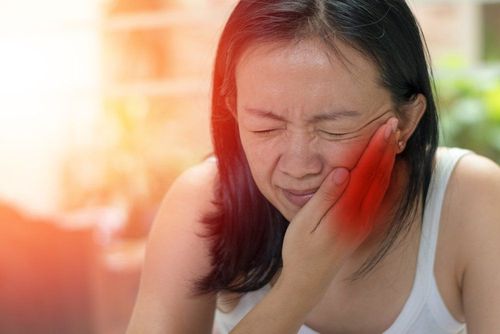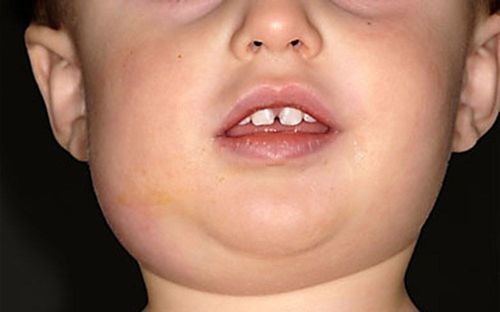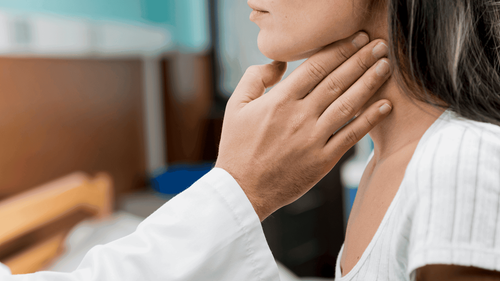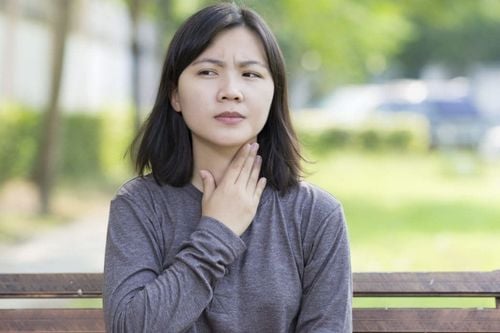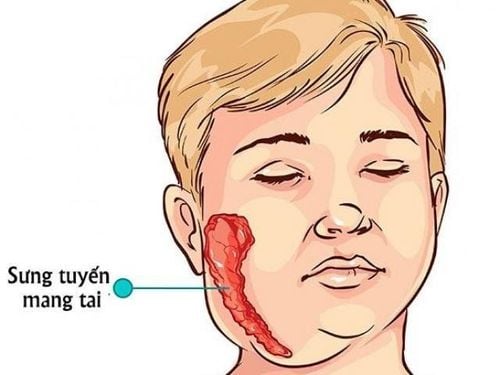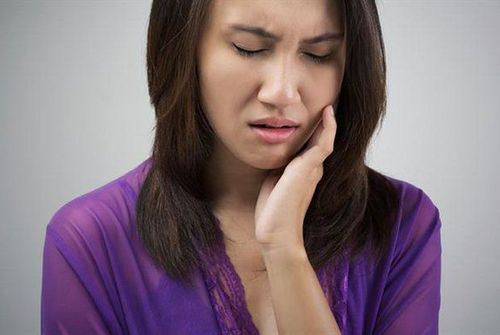This is an automatically translated article.
Mumps is a benign disease, but currently there is no specific treatment for mumps. Therefore, the basic way to cure mumps is to treat symptoms and monitor and prevent possible complications.
1. Mumps
Mumps is an acute bacterial infection caused by a virus belonging to the Paramyxovirus group that causes inflammation of the salivary glands, sometimes also inflammation of the gonads, pancreas and meninges. Mumps is transmitted through the respiratory tract and can easily become an epidemic. The disease usually appears in winter - spring, is common in school age and can cause dangerous complications.
The clinical forms of mumps are based on the locality of the virus, including inflammation of the parotid (commonly known as mumps), submandibular, and sublingual salivary glands; inflammation of the testicles, ovaries; pancreatitis, meningitis, encephalitis - meningoencephalitis... Each type of inflammation has typical and hidden forms.
Complications, sequelae in mumps are few but quite severe:
For men, mumps can cause infertility because both testicles are severely inflamed. Orchitis is common in the sexually mature or developing age group and accounts for about 20-30% of mumps cases in adults. Complications usually occur on the 5th to 8th day of the illness, when the symptoms of salivary gland inflammation have subsided, rarely before that day; In female patients, common complications are ovarian inflammation, mastitis, and mucinous lymphadenitis, which can cause premature birth or damage to the cornea, heart, and brain in the fetus. For children, complications can cause permanent hearing loss, encephalitis, diabetes due to prolonged pancreatitis.
2. Signs of mumps

Biểu hiện chủ yếu của bệnh quai bị là sốt và sưng, đau một hoặc nhiều tuyến nước bọt
The main manifestation of mumps is fever and swelling, pain in one or more salivary glands, usually in the parotid, sublingual or submandibular salivary glands.
Usually after being infected with the virus, the patient will experience an incubation period of 18-25 days without any symptoms.
When the disease turns into an acute onset, the patient may have a high fever of 38 - 39 degrees Celsius or more accompanied by headache, fatigue, joint pain, poor sleep.
The disease will turn into a full-blown phase after half a day or a day, causing the parotid salivary glands to become inflamed. The patient feels a sharp pain in the corner of the jaw, sees the angle of the jaw bulge, the skin is tight and smooth but not hot, not red.
Patients often have inflammation on both sides of the parotid salivary glands, separated from each other by 1-3 days (only 1/3 of cases have inflammation on one side) accompanied by oral mucositis, edema, and redness around the orifice. salivary conduction of the parotid gland.
When the disease is recovered with the signs of fever disappearing after 4-5 days, the swelling and pain symptoms will gradually decrease and then return to normal after 8-10 days from the date of illness.
Mumps is often confused with diphtheria and bacterial cervical lymphadenitis. Therefore, it is necessary to take the patient to the doctor to determine the exact condition of the disease.
3. How to cure mumps
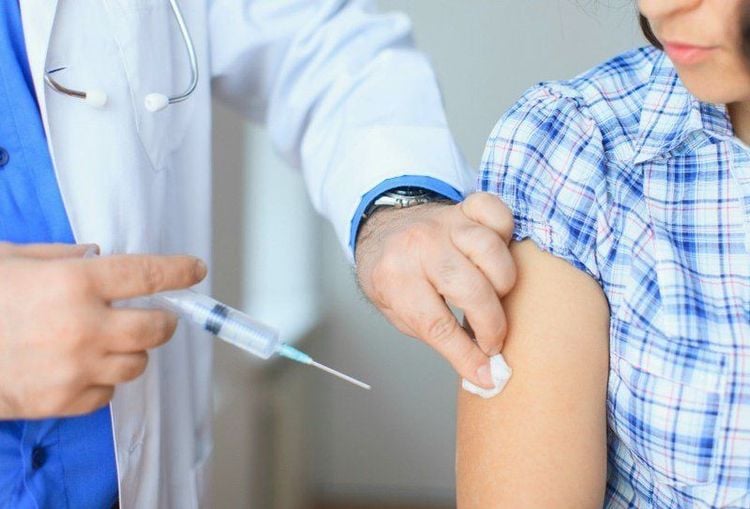
Tiêm vắc xin là cách hiệu quả nhất để phòng ngừa quai bị
Vaccination is the most effective way to prevent mumps. However, if the patient has not been vaccinated against the disease or has not received 2 doses of the mumps vaccine at the recommended time interval, the patient can get mumps.
When you have mumps, you can only treat the symptoms of the disease, because there is no specific treatment for the disease. Because it is a benign disease, mumps is usually treated at home. The most important thing is to follow up to detect complications in time.
Some notes when taking care of mumps patients:
To prevent the spread of the disease from one person to another, people with mumps should be isolated and rested at home. The disease will go away on its own after about 5 to 7 days if there are no complications. The parotid area will gradually reduce swelling and recover completely after 10 days. Should lie down to rest in place, limit movement, limit exercise, eat snacks, eat liquid food in the first days, gargle with salt water. For patients with inflammation of the salivary glands, fever: apply warm compresses to the painful area, use paracetamol to relieve pain and reduce fever. Paracetamol should be used with caution in patients with liver disease and should be used at the dose prescribed by your doctor. Mumps should not be treated with folk methods such as using ink, pot, leaves, lime or plaster on the swollen area. These methods can cause heat, burns, creating conditions for germs from outside to enter the parotid gland, making inflammation worse, even blood infection. If you have orchitis: Men with mumps should wear tight underwear to hang the testicles, apply heat, use pain relievers (paracetamol or ibuprofen), use corticosteroids (prednisolone, desamethason...). Corticosteroids have good anti-inflammatory and analgesic effects, at first, at high doses, then gradually reduce the dose for 7-10 days, this is a drug with many side effects on many organ systems such as causing cushing's syndrome, causing inflammation. peptic ulcer, can cause gastrointestinal bleeding in patients with pre-existing gastro-duodenal disease, osteoporosis, immunosuppression... However, these side effects can be controlled If the drug is used cautiously, strictly follow the doctor's orders. In the case of encephalitis, meningitis, it is necessary to use corticosteroids, closely monitor the patient's progress to avoid superinfection and need to rule out other causes of encephalitis and meningitis. Patients presenting with pancreatitis are usually benign, but these patients still need to be closely monitored for abdominal pain, vomiting, and blood tests to avoid missing serious complications such as pancreatic pseudocysts or to differentiate from other diseases. surgery. With some manifestations of arthritis, thyroiditis ... without specific treatment can use pain reliever, anti-inflammatory alone (paracetamol). When treating at home, do not exercise much to avoid complications of meningitis, orchitis or ovarian inflammation. When there are symptoms of vomiting, headache, abdominal pain even when the swelling in the parotid has decreased, you should go to the doctor immediately to promptly handle the condition. To prevent mumps, young children over 12 months old, women who are about to become pregnant, and men who have not been vaccinated against mumps... can go to Vinmec International General Hospital for advice. consultation, scheduling and vaccination against mumps - measles - rubella, in order to prevent the disease in the safest and most effective way.
All biological products and vaccines at Vinmec are of clear origin; preserved on the cold chain according to strict standards of the Ministry of Health and the World Health Organization. Customers are examined and screened before injection, and their health is monitored after injection to ensure the highest safety and effectiveness of vaccination.
Please dial HOTLINE for more information or register for an appointment HERE. Download MyVinmec app to make appointments faster and to manage your bookings easily.




